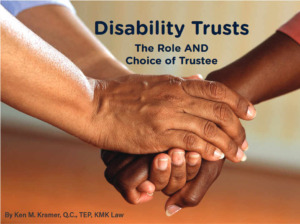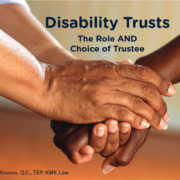Disability Trusts – The Role and Choice of Trustee

The following article was first published in the June 2022 edition of the Balance Newsletter.
The initial steps in developing an estate plan can be overwhelming and intimidating. However, for individuals with children with disabilities, there are many additional challenges and considerations. A significant one being how to leave an inheritance within a will without impacting that disabled individual’s entitlement to provincial disability benefits.
Additionally, for adult children with disabilities that do not have the ability to manage an inheritance themselves dueto incapacity, this routinely results in the need for thedevelopment of a fully discretionary trust (sometimescalled a “Henson Trust”) written within the parents’ will.
By way of refresher (also see Balance March 2021 for more on trusts and disability planning), a trust is a relationship whereby someone, the Trustee, holds money or other assets for the benefit of someone else, the Beneficiary. (A third role, the Settlor, is the person who gives money or other assets to the Trustee to hold for the benefit of the Beneficiary.)
The Beneficiary in this case is typically the person with a disability. The Trustee’s role, amongst many other considerations, is to manage the money or other assets for the Beneficiary, including investing, filing tax returns, keeping financial records, exercising trustee discretion, etc.
Two major challenges for families are:
- Who is going to manage the trust for my daughter or son with a disability upon my passing and
- What happens if this/these individual(s) are unable to assume this very important role, or determine that they cannot take on this role at a later point?
The Trustee may be a family member, a friend, or an able-bodied sibling of the disabled child. For some families,there may also be further exploration into whether a corporate trustee, such as a financial institution, a family lawyer, or accountant could serve in such a capacity. This then necessitates an assessment of the costs associated with corporate trusteeship, and whether the size of the estate and/or the trust fund justifies the appointment of a corporate trustee.
No matter what choice of a trustee a family makes, it is never a simple matter and the following are some questions families should ask themselves when making
their decision:
- What impact, if any, will there be on the relationship between the trustee and the disabled beneficiary?
- Is there a potential for conflict of interest if a sibling is named as the alternate beneficiary of the disabled beneficiary’s trust fund?
- How old should the trustee be? A disability trust may be in existence for many years,and it is important that the trustee outlive the beneficiary.
- Is the trustee capable and/or does he/she have the ability to administer a trust given the current demands of their own family and career?
- Should there be a mechanism within the disability trust to remove and/or replace trustees or permit them the opportunity to resign?
- Where does the intended trustee reside and how complex is the disability trust to administer?
- Does the trustee or trustees have knowledge and/or experience relating to the relevant provincial disability legislation and regulations?
Beyond this list, I believe the biggest challenge for parents is ensuring that the chosen trustee appreciates and under-stands the unique needs of their son or daughter with a disability.
Families must choose and have confidence in a trustee who will carry on where they have left off when they pass on and ensure that their son or daughter has the sup-ports they require to survive in our community for years to come.
Putting these decisions off for another day is the easy answer, however, families with children with disabilities cannot afford such delays. The future of their children necessitates that they take steps to plan appropriately and seek adequate supports and expertise to ensure that their
children continue to have, “a good life”.
About the Author:
Ken M. Kramer, Q.C.’s law firm, KMK Law, provides specialized legal services in the areas of Wealth Management, Estate Planning, Estate Litigation and Mediation. Ken M. Kramer, Q.C. is also involved extensively in both his community and the legal profession, having served on numerous Boards and Committees over his 25 year legal career. Currently, Ken M. Kramer, Q.C. serves as a Board Member with the Vancouver Airport Authority (“YVR”), Publicly Appointed Member of the Board of the College of Chiropractors of British Columbia,and a Board Member with Technology for Living.
Ken M. Kramer, Q.C.’s assistance in providing this information is appreciated. Readers are cautioned that the information expressed in this article should in no way be construed as legal advice.
To read the entire Balance newsletter, click here.




